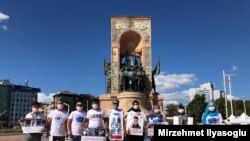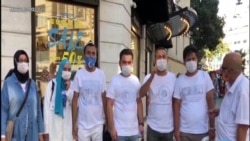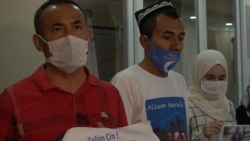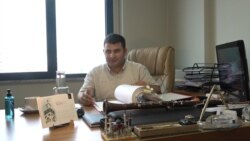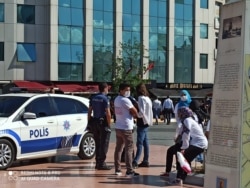Uighur activists in Turkey say they face growing pressure from Turkish authorities, stoking fears that Ankara is starting to bend to Chinese lobbying.
Tens of thousands of Uighurs have sought sanctuary in Turkey from an ongoing crackdown by Chinese authorities against the mostly Muslim minority.
Hundreds of thousands of Uighurs are currently held in detention camps, which Beijing calls re-education centers.
Turkey is an important base for Uighurs campaigning against the crackdown by China, but activists fear Ankara is seeking to curb such protests.
"On Turkish soil, you cannot raise a voice against China," said a small group of Uighurs at a protest earlier this month.
The police detained the protesters for wearing T-shirts displaying pictures of family members interned by Chinese authorities.
Mirzehmet Ilyasoglu, one of the protest organizers, explained they were only released after being told by police to turn their T-shirts inside out.
"Forcing us to wear these T-shirts inside out insulted not only our honor but our mothers and brothers, as well," said Ilyasoglu, who spoke at an Istanbul Uighur community center.
Other Uighurs carried photographs of family members held by Chinese authorities.
Until last year, large Uighur protests against China were often held in Turkey. In December, thousands backed by local Turks demonstrated in Istanbul against Beijing.
The plight of Uighurs in China resonates strongly among religious and nationalist Turks who make up important voting constituencies of President Recep Tayyip Erdogan.
But such protests are becoming increasingly rare with Uighur activists complaining that Turkish authorities are now targeting them.
"Police detained me in a restaurant and took me to the Sefakoy (Istanbul district) precinct," said Uighur poet Abdurehim İmin Parach. "They handed me a document and asked me to sign it. It said, 'This person is affiliated with organizations that are a threat to Turkey.' I said, 'I have nothing to do with these groups, and I won't sign it.'"
Parach said it was the second time this year that police had detained him. He believes it is part of a broader policy.
"This has happened to 20 other Uighurs I know," he said.
Parach fled to Istanbul seven years ago. After leaving China, his wife was put in a Chinese detention camp.
Turkish authorities have detained some Uighurs for links to Islamic State. But rights groups allege recent Uighur detentions are more about appeasing China.
"People are taken into detention with the accusation of foreign terrorist fighters, even though there is no evidence," said lawyer Ibrahim Ergin of the Istanbul-based International Refugee Rights Association.
Ergin is currently fighting several Chinese extradition attempts against prominent Uighur activists.
"We know that China is putting great pressure on the Interior and Foreign Affairs Ministry and the security forces," Ergin explained.
He added, "During our communication with these authorities, we are told that deporting five to 10 Uighurs would make Turkey more comfortable economically and politically."
Ergin said given Turkish public support for Uighurs, it is unlikely any will face deportation to China.
"If the state sends any Uighurs back, it will put the government in big trouble. They will be seriously harmed politically," he said.
This year, the Washington-based East Turkistan Government in Exile recently filed a complaint against China at the International Criminal Court against China, which included the allegations that a Uighur exile in Turkey was extradited to Tajikistan, and then sent to China.
Erdogan’s opponents have seized upon the accusation.
"There are reports in the media that Turkey is conducting efforts to send 50,000 of our Uighur brothers and sisters to Tajikistan and from there to China," said former Prime Minister Ahmet Davutoglu, in an address to his newly formed Future Party.
Ankara dismissed the allegations of backdoor extraditions and pressure on Uighur activists.
"Turkey's position is perfectly clear. Tens of thousands of Uighurs live peacefully in Turkey. Thousands have Turkish citizenship. Actions speak louder than words," said a senior Turkish official, speaking on condition of anonymity.
But Erdogan, who often presents himself as an advocate for discriminated Muslims worldwide, failed to join the chorus of international condemnation over recent reports on China's crackdown on Uighurs.
Some observers suggest that Erdogan is performing a delicate diplomatic balancing act of seeking not to alienate China, a vital trading partner, while also providing sanctuary to Uighurs, a key demand of his voting base.
But for Parach, who has not heard from his family in years, Erdogan's silence only adds to growing unease.
"The authorities have been keeping silent. Because of this silence, I feel scared. I can't speak about my future. If I do, I will upset myself with bad thoughts, because my future is in unknown darkness," Parach said.




